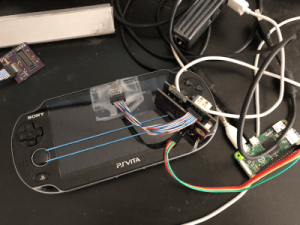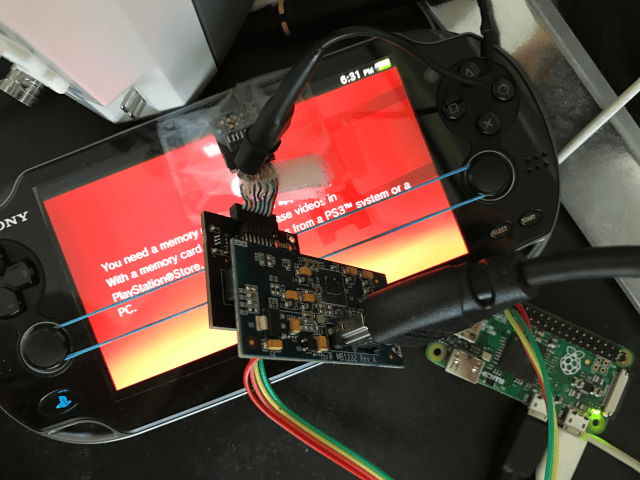More actions
No edit summary |
No edit summary |
||
| (4 intermediate revisions by the same user not shown) | |||
| Line 1: | Line 1: | ||
{{Infobox Vita Homebrews | {{Infobox Vita Homebrews | ||
|title=ngptv | |title=ngptv | ||
|image= | |image=ngptvvita2.png | ||
|description=An attempt at making an HDMI adapter for the Vita. | |description=An attempt at making an HDMI adapter for the Vita. | ||
|author=yifanlu | |author=yifanlu | ||
| Line 14: | Line 8: | ||
|version=2017 | |version=2017 | ||
|license=CC-BY-4.0 | |license=CC-BY-4.0 | ||
|download=https://dlhb.gamebrew.org/vitahomebrews/ | |download=https://dlhb.gamebrew.org/vitahomebrews/ngptv.zip | ||
|website=https://yifan.lu/2017/12/31/vita-hdmi-mod-attempt/ | |website=https://yifan.lu/2017/12/31/vita-hdmi-mod-attempt/ | ||
|source=https://github.com/yifanlu/ngptv | |source=https://github.com/yifanlu/ngptv | ||
}} | }} | ||
{{#seo: | |||
|title=Vita Homebrew PC Tools (Developments) - GameBrew | |||
|title_mode=append | |||
|image=ngptvvita2.png | |||
|image_alt=ngptv | |||
}} | |||
This is an attempt at making an HDMI adapter for the Vita. It does not work because the ADV7533 does not support the auto clock stopping that the Vita uses to save battery on the MIPI DSI clock. There are two ways of getting it to work. | This is an attempt at making an HDMI adapter for the Vita. It does not work because the ADV7533 does not support the auto clock stopping that the Vita uses to save battery on the MIPI DSI clock. There are two ways of getting it to work. | ||
| Line 25: | Line 26: | ||
The project is no longer being worked on and two of the designs are open source for those who are interested in continuing where it was left off. | The project is no longer being worked on and two of the designs are open source for those who are interested in continuing where it was left off. | ||
The first design is ngptv, which is supposed to be a small board that fits inside the Vita. Due to the design constraints of the ADV7533 (small pitch BGA) which requires > 6 layers and the small size requirement of all components, it does not seem feasible for me to prototype (too expensive and not having the right equipment to assemble). Additionally, the ADV7533 is a NDA part that requires a HDMI license to buy. | |||
The second design is ngptv lite which is designed to connect directly to a [http://www.st.com/en/development-tools/b-lcdad-hdmi1.html B-LCDAD-HDMI] daughterboard. This $30 board contains a ADV7533 and was originally designed to work with a ST evaluation board. We instead connect it to the ngptv lite which has a microcontroller to interface with ADV7533 as well as a redriver for MIPI DSI. Using a [https://www.samtec.com/products/fftp-07-d-03.85-01-n FFTP-07-D-03.85-01-N] cable, this connects to a breakout board placed inside the Vita that brings in the MIPI DSI signals from the exposed testpoints. The first version lacked the redriver, which seemed to still work (to the extent that it works if you manually set the Vita's MIPI clock to not use LP mode, which breaks the on screen video). | The second design is ngptv lite which is designed to connect directly to a [http://www.st.com/en/development-tools/b-lcdad-hdmi1.html B-LCDAD-HDMI] daughterboard. This $30 board contains a ADV7533 and was originally designed to work with a ST evaluation board. We instead connect it to the ngptv lite which has a microcontroller to interface with ADV7533 as well as a redriver for MIPI DSI. Using a [https://www.samtec.com/products/fftp-07-d-03.85-01-n FFTP-07-D-03.85-01-N] cable, this connects to a breakout board placed inside the Vita that brings in the MIPI DSI signals from the exposed testpoints. The first version lacked the redriver, which seemed to still work (to the extent that it works if you manually set the Vita's MIPI clock to not use LP mode, which breaks the on screen video). | ||
These designs are provided as-is under CC 4.0. | These designs are provided as-is under CC 4.0. | ||
==Screenshots== | |||
https://dlhb.gamebrew.org/vitahomebrews/ngptvvita3.png | |||
== External links == | == External links == | ||
* Author's website - https://yifan.lu/2017/12/31/vita-hdmi-mod-attempt/ | * Author's website - https://yifan.lu/2017/12/31/vita-hdmi-mod-attempt/ | ||
* GitHub - https://github.com/yifanlu/ngptv | * GitHub - https://github.com/yifanlu/ngptv | ||
Latest revision as of 07:56, 4 August 2024
| ngptv | |
|---|---|
 | |
| General | |
| Author | yifanlu |
| Type | Developments |
| Version | 2017 |
| License | CC-BY-4.0 |
| Last Updated | 2017/12/30 |
| Links | |
| Download | |
| Website | |
| Source | |
This is an attempt at making an HDMI adapter for the Vita. It does not work because the ADV7533 does not support the auto clock stopping that the Vita uses to save battery on the MIPI DSI clock. There are two ways of getting it to work.
- Replace the ADV7533 with another part that supports MIPI clock going from HS to LP mode when the data lanes are not in use. There are no other DSI to HDMI part, but you might get away with stacking a DSI to eDP and eDP to HDMI for example. Another way is to use a FPGA and convert the signals manually.
- Creating some custom part to "filter" the stopped clock to a continuous clock. There does not appear to be any off-the-shelf part that fit for the purpose as they average out the clock signals instead of locking on to the highest frequency.
The project is no longer being worked on and two of the designs are open source for those who are interested in continuing where it was left off.
The first design is ngptv, which is supposed to be a small board that fits inside the Vita. Due to the design constraints of the ADV7533 (small pitch BGA) which requires > 6 layers and the small size requirement of all components, it does not seem feasible for me to prototype (too expensive and not having the right equipment to assemble). Additionally, the ADV7533 is a NDA part that requires a HDMI license to buy.
The second design is ngptv lite which is designed to connect directly to a B-LCDAD-HDMI daughterboard. This $30 board contains a ADV7533 and was originally designed to work with a ST evaluation board. We instead connect it to the ngptv lite which has a microcontroller to interface with ADV7533 as well as a redriver for MIPI DSI. Using a FFTP-07-D-03.85-01-N cable, this connects to a breakout board placed inside the Vita that brings in the MIPI DSI signals from the exposed testpoints. The first version lacked the redriver, which seemed to still work (to the extent that it works if you manually set the Vita's MIPI clock to not use LP mode, which breaks the on screen video).
These designs are provided as-is under CC 4.0.
Screenshots

External links
- Author's website - https://yifan.lu/2017/12/31/vita-hdmi-mod-attempt/
- GitHub - https://github.com/yifanlu/ngptv
